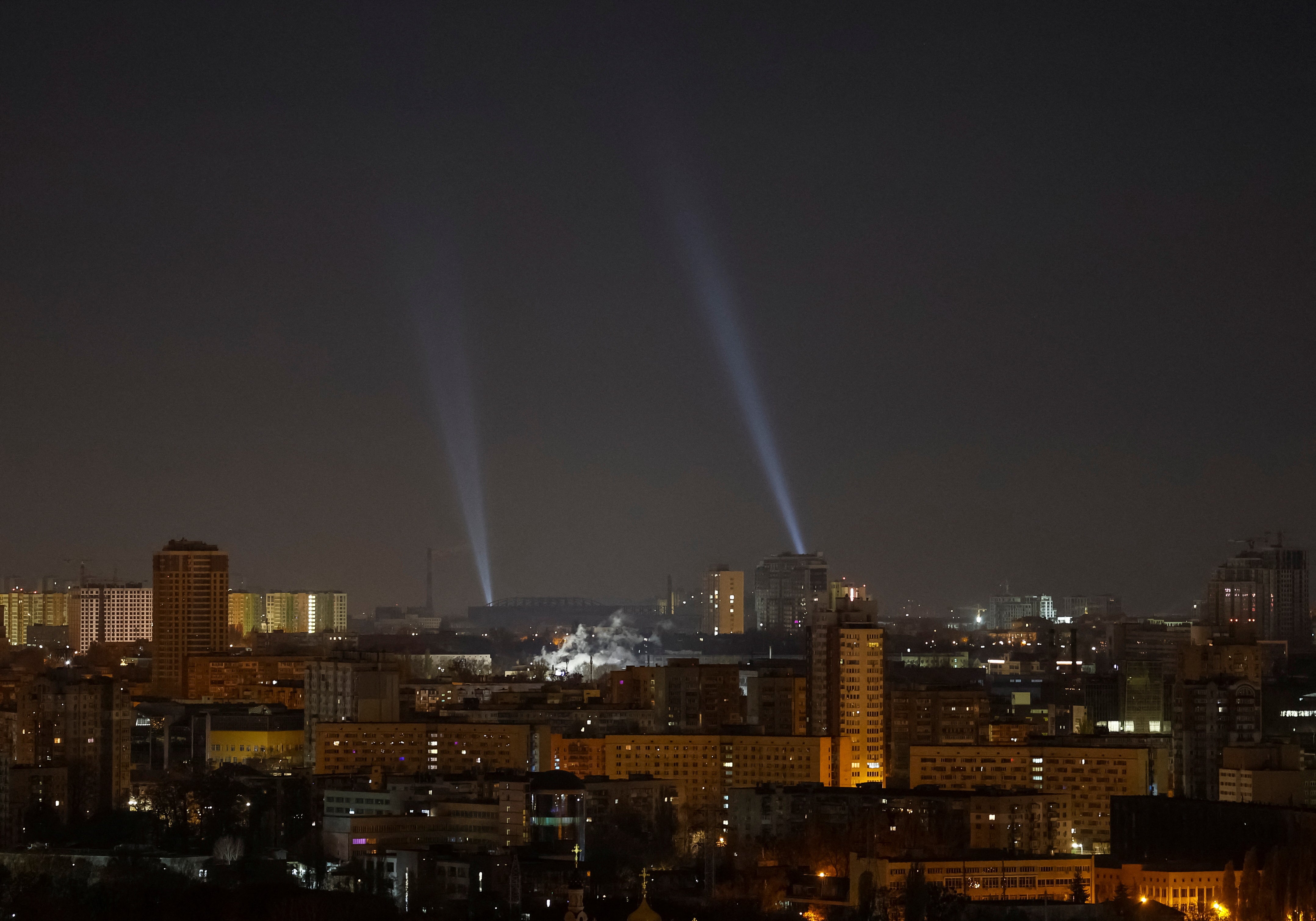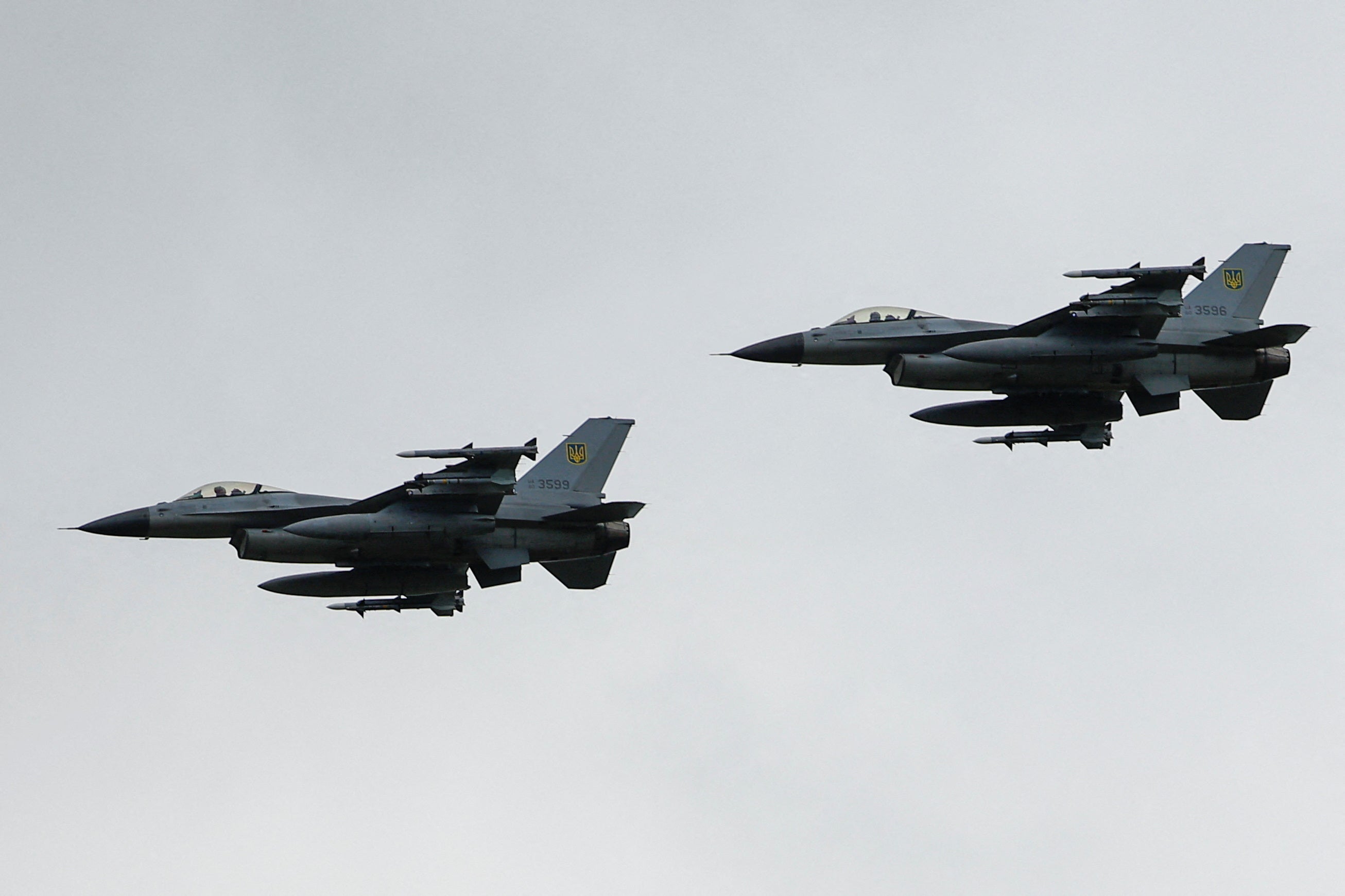
US reopens Kyiv embassy after Ukraine firing of ATACMS missiles into Russia prompted potential strike threat
PHOTO CAPTION: Ukrainian service personnel use searchlights as they search for drones in the sky over the city during a Russian drone strike, amid Russia's attack on Ukraine, in Kyiv, Ukraine November 20, 2024. REUTERS/Gleb Garanich
By Anastasiia Malenko, Tom Balmforth and Max Hunder
KYIV (Reuters) - The United States said it had reopened its embassy in Kyiv late on Wednesday after it had shut for the day due to what it called the threat of a significant air attack, a day after Ukraine used American missiles to hit a target inside Russia.
Russia had described the strike by U.S. missiles as an escalation in the 1,000-day-old war, while Ukraine's military spy agency said Russia was trying to sow panic by circulating fake online messages about a looming missile and drone attack.
"@USEmbassyKyiv has resumed services following a temporary shelter-in-place suspension earlier today," U.S. Ambassador to Ukraine Bridget Brink wrote on X.
"We continue to encourage U.S. citizens to remain vigilant, monitor official Ukrainian sources for updates, and be prepared to shelter in place if an air alert is announced."
The U.S. State Department had earlier said it expected the Kyiv embassy to resume normal operations on Thursday.
The initial State Department statement on the embassy's website said the embassy would be closed "out of an abundance of caution". Embassy employees, it said, were being instructed to "shelter in place".
"The U.S. Embassy recommends U.S. citizens be prepared to immediately shelter in the event an air alert is announced."
The Kremlin said it had no comment.
A U.S. government source said the embassy closure was "related to ongoing threats of air attacks". The Italian and Greek embassies said they too had closed their doors. The French embassy remained open but urged its citizens to be cautious.
President Volodymyr Zelenskiy, said that "panic-inducing messages circulated today only help Russia", but warned Ukrainians to pay close attention to air raid alerts.
"However many brutal and treacherous attacks by Russia we have endured... it is always important to pay attention to air raid warnings," he said in his nightly video address. "We have a neighbour that is insane."
The GUR military intelligence body said: "The enemy, unable to subdue Ukrainians by force, resorts to measures of intimidation and psychological pressure on society. We ask you to be vigilant and steadfast."
Zelenskiy also expressed thanks for a new $275 million U.S. military aid package announced by the State Department focusing on ammunition, drones and missiles.
Ukraine on Tuesday used U.S. ATACMS missiles to attack an arms depot inside Russia, making use of newly granted permission from the outgoing administration of U.S. President Joe Biden on the 1,000th day of Russia's full-scale invasion of Ukraine.
Russia has been signalling to the United States and its allies for weeks that if they give permission to Ukraine to strike deep into Russian territory with Western-supplied missiles then Moscow will consider it a major escalation.
Russian foreign intelligence chief Sergei Naryshkin said in an interview published on Wednesday that Moscow would retaliate against NATO countries that facilitate long-range Ukrainian missile strikes against Russian territory.
PSYCHOLOGICAL OPERATION
In the early afternoon, the Ukrainian air force told people to seek shelter because of a missile threat. Senior officials told people not to ignore the alert.
That came shortly before the GUR spy agency issued a warning about a Russian psychological operation it said involved fake messages claiming to have been sent by the agency.
"A message is being spread via messengers and social networks ... about the threat of a 'particularly massive' missile and bomb strike on Ukrainian cities today," GUR said in a statement.
Two Ukrainian military personnel told Reuters they received messages informing them that Russia would launch more than 300 drones and also use warships, warplanes and ground-based systems to fire missiles in a huge salvo.
Reuters could not immediately determine how the messages were sent. One soldier said he received one from a friend.
The war is at a volatile juncture, with nearly a fifth of Ukrainian territory in Russian hands, North Korean troops deployed in Russia's Kursk region and doubts over future aid as U.S. President-elect Donald Trump returns to the White House.
On Sunday, Russia staged a massive missile and drone strike on Ukraine's national power grid that killed seven people and renewed fears over the durability of the hobbled energy network.
The GUR spy agency said earlier that a Russian military command post had been "successfully struck" in the town of Gubkin in Russia's Belgorod region, around 168 km (105 miles) from the border with Ukraine.
The statement did not specify who carried out the attack, when it took place or the type of weapon used. Ukraine has also used drones for deep strikes against targets in Russia.
Bloomberg later cited a Western official as saying Ukraine had fired UK Storm Shadow missiles into Russia. A spokesperson for Prime Minister Keir Starmer said his office would not be commenting on reports or operational matters. There was no immediate comment from Ukraine.
'PERSISTENT RUSSIAN ATTACKS'
The embassy in Kyiv urged U.S. citizens in Ukraine to have reserves of water, food and other essentials such as required medications for the event of a "possible temporary loss of electricity and water" caused by Russian strikes.
"Persistent Russian attacks targeting civilian infrastructure throughout Ukraine may result in power outages, loss of heating, and disruption of municipal services," it said.
On Tuesday, Russian President Vladimir Putin lowered the threshold for a nuclear strike in response to a broader range of conventional attacks. Washington said afterwards it had not seen any reason to adjust its nuclear posture.
(Reporting by Lidia Kelly, Anastasiia Malenko, Kanjyik Ghosh and Tom Balmforth; Writing by Tom Balmforth Editing by Christopher Cushing, Himani Sarkar, Peter Graff, Philippa Fletcher, Ron Popeski and Diane Craft)










